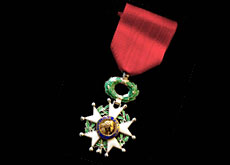Swiss remain wary of foreign honours

The Neuchâtel ethnologist, Pierre Centlivres, is to receive France’s highest civilian award, the Legion of Honour - the seventh Swiss to receive the decoration this year.
But foreign honours still remain out of reach for public servants and members of the armed forces, who are prevented by a 150-year-old law from accepting such favours.
Centlivres headed the University of Neuchâtel’s ethnology institute from 1974 to 1998.
An Afghan specialist, he was also an adviser to the national museum in Kabul from 1964 to 1966.
However, he remains in the dark as to why he was picked out for the Legion of Honour. “I assume it’s for the work I did with French institutions,” he said.
But while many foreigners are awarded the decoration, not every Swiss can accept it. Precise rules lay down exactly which citizens can receive foreign honours.
Before 1848, the Swiss Confederation’s biggest export was soldiers. To guarantee the loyalty of these mercenaries, foreign monarchs, especially the French, used to award them pensions, titles and medals.
But when Switzerland’s first constitution was drawn up in 1848, the authorities wanted to guarantee the new state’s independence.
All mercenary service was abolished with the exception of the Vatican Guard, and strict guidelines for foreign awards were established.
Swiss Constitution
Article 12 of the Constitution said that parliamentarians and federal employees could not receive or wear foreign decorations. When it was revised in 1874, the ban was extended to citizens serving in the army.
This did not stop some politicians from receiving awards. The most famous case involved Gustave Ador, a federal minister at the end of the First World War, who wore the Legion of Honour’s Grand Cross, the highest possible distiniction.
In 1931, to prevent further abuses of this type, the government tightened the rules, banning cantonal authorities and employees from accepting foreign honours.
Parliamentarians were also told to hand back any medals, even if they had been awarded before being elected to office.
This happened to Geneva’s Jean Ziegler, who had to give up on his officer’s rank in the French Order of the Arts in 1987.
New law
The latest revision of the Constitution in 1999 saw Article 12 disappear altogether. Parliament decided that such a ban could be covered by legislation.
The new law goes over the much of the same ground previously covered in the Constitution.
Citizens serving in the army, parliamentarians and federal employees cannot accept foreign awards. Those who received them before taking office simply have to restrain from wearing their medals in public.
The United States has similar legislation, and most countries have to grant permission for their citizens to accept foreign awards.
However, Centlivres reckons there is nothing wrong with wearing a medal from another country.
“There is no reason to hide an honourable distinction,” he said.
swissinfo, Olivier Pauchard (translation: Scott Capper)
Centlivres is the seventh Swiss to receive the award this year.
A 150-year-old law prevents some from accepting such awards.
Many countries require permission for their citizens to accept foreign awards.
Swiss ethnologist Pierre Centlivres has been awarded France’s highest distinction, the Légion d’Honneur.
Not all Swiss can accept foreign awards; members of the armed forces, government employees and parliamentarians are banned from receiving them under national legislation.
This ban was originally implemented in the 1848 Swiss constitution, as a means of guaranteeing Switzerland’s independence from foreign interests.

In compliance with the JTI standards
More: SWI swissinfo.ch certified by the Journalism Trust Initiative









You can find an overview of ongoing debates with our journalists here . Please join us!
If you want to start a conversation about a topic raised in this article or want to report factual errors, email us at english@swissinfo.ch.